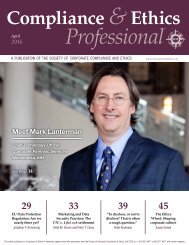Compliance & Ethics-Lanterman interview
Create successful ePaper yourself
Turn your PDF publications into a flip-book with our unique Google optimized e-Paper software.
FEATURE<br />
AT: One of the things that I find most<br />
troubling about this issue is that there are<br />
so many potential intruders. You could have<br />
a hacker wanting to access your system for<br />
fun or malicious reasons, state actors and<br />
competitors looking for trade secrets, and let’s<br />
not forget employees with a grudge or who<br />
are just careless. How would you prioritize the<br />
risks among these and other potential sources<br />
of breach?<br />
ML: Motive is<br />
important in analyzing<br />
and understanding<br />
cyber breaches in<br />
order to prevent them.<br />
However, I don’t think<br />
it should matter what<br />
a hacker’s motive<br />
may be. Every breach<br />
should be treated as a<br />
malicious, serious, and<br />
potentially damaging<br />
threat. That said, the<br />
nature of different<br />
threats, and consequently, the potential<br />
damage of a breach, is really dependent on<br />
an organization’s digital infrastructure. Thus,<br />
organizations are really in the best position<br />
to rank these threats for themselves. We have<br />
certainly seen that different organizations are<br />
in different spots on the spectrum.<br />
AT: Are there specific strategies that<br />
companies should employ to counter each of<br />
these threats? If so, what would they be?<br />
ML: While there are specific measures that<br />
organizations can take, it is highly dependent<br />
upon the variables in a given organization. In<br />
other words, there is no “one size fits all” for<br />
a strong digital security plan. Furthermore,<br />
the technology changes on a daily basis. The<br />
most secure companies are the ones that do<br />
not let their security plans grow stagnant.<br />
The best are those that account for changes<br />
Our primary<br />
observation over the<br />
years has been that data<br />
breaches occur because<br />
of a simple lapse of<br />
judgement. The single<br />
most important aspect<br />
of security is people.<br />
in the technology, educate employees, and<br />
audit consistently.<br />
AT: What do the strategies all have in<br />
common? Put another way, what should every<br />
company be doing right now?<br />
ML: Our primary observation over the<br />
years has been that data breaches occur<br />
because of a simple lapse of judgement. The<br />
single most important aspect of security is<br />
people. The human<br />
element of technology<br />
is just as, if not more,<br />
important than the tech<br />
itself. It can only ever<br />
be achieved through<br />
education and strong<br />
implementation of<br />
written digital use<br />
policy. I like to refer<br />
to this as fostering a<br />
“culture of security.”<br />
Therefore, I think that<br />
companies should be<br />
educating their employees on a regular basis<br />
about the realities of digital attacks, how to<br />
recognize them, and what to do in the case<br />
that something does happen. Such education<br />
programs should cover everything within<br />
the company’s digital security policies—from<br />
mobile devices, to social media, to passwords<br />
and encryption and backups.<br />
AT: What are some of the common<br />
mistakes you see companies making when it<br />
comes to shoring up their cyber defenses?<br />
ML: I think the biggest mistake I have seen<br />
is over-confidence. Many organizations believe<br />
that they have done all they can to prevent a<br />
breach, and are thus absolved from putting<br />
in place any sort of contingency plan should<br />
a breach occur. These organizations adopt<br />
a posture of: “Something like that cannot<br />
possibly happen to me.” When breaches<br />
<strong>Compliance</strong> & <strong>Ethics</strong> Professional ® April 2016<br />
+1 952 933 4977 or 888 277 4977 www.corporatecompliance.org 15







